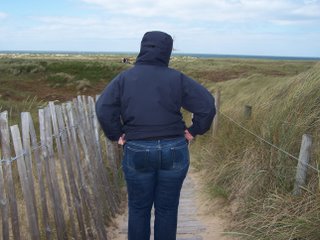This book totally surprised me! I have never seen the movie or read any of Sparks work. Something intrigued me when a few people had this book on their Summer Challenge reading list. http://summerreadingchallenge200.phpbbnow.com/viewforum.php?f=1
I pulled it of the shelf at work, and it wasn’t very big and it was paperback…so I thought it might make a good vacation read. I was right, but I had no idea that I wouldn’t read it once but twice…in a row! I’ve never, ever done that. Even if I had to write on a book in college, I never read the whole thing again. But I had to this one. It wasn’t just that it was a good read. Spark has an interesting way of writing. I’ve not decided if she tried to write this in the way a child would have written it, or this is just how she writes. (I’ll have to read more of her books to sort that out.) She goes back and forth between the present and the future. I knew when I finished I had to reread to catch the little pieces that I missed the first time to put the whole puzzle together. I still haven’t totally. I actually went and looked at criticism book just to get someone else’s opinion.
I know that some people doing the challenge quit reading the book because they found the writing aggravating. I think that with all writing pre-WWII you have to keep in mind what was going on in history. Especially when it comes to the way women lived. Jean Brodie is one of the many thousands of women who lost their men in the WWI. Jean lost her true love she was sure she would have married. Since most of the men were either killed in the war, or where horribly traumatized and hurt, there weren’t enough men to go around to all the women of marriageable age. This lead too many women living the life of spinsters, so what were they suppose to do with their time? They had no husband or children to take care of, no household to maintain. Muriel Spark, unfortunately I think, waits until the middle of the book to explain what life was like for them. The start of chapter three she explains:
It is not to be supposed that Miss Brodie was unique at this point of her prime; or that (since such things are relative) she was in any way off her head, She was alone, merely, in the she taught in a school like Marcia Blain’s. There were legions of her kind during the nineteen-thirties, women from the age of thirty and upward, who crowded their war-bereaved spinsterhood with voyages of discovery into new ideas and energetic practices in art or social welfare, education or religion... she was not out of place amongst her own kind, the vigorous daughters of dead or enfeebled merchants, or ministers of religion, University professors, doctors, big warehouse owners of the past, or the owners of fisheries who had endowed these daughters with shrewd wits, high-coloured cheeks, constitutions like horses, logical educations, hearty spirits and private means. (42)
So what is it that Brodie gets up to at this school that is different then the other spinsters of her age? Well she tries to manipulate the lives of a few select girls in her class. These girls become the “Brodie Set” and are given lots of extra attention by Miss Brodie. As the book plays out, in the end the one girl that she had the most effect on betrays her. The head of the school had for years tried to get rid of Brodie. She had been trying on moral grounds, but one of the girls steers her in another direction. A direction that leads to Brodie’s downfall (historically this brought about the downfall of many of the aristocracy of that time). I leave you to find out what this was, and which girl finally brings an end to Brodie’s meddling in the lives of her students.
I’m still left with one question…and if you figure it out please write me! Why does the character Sandy become a Nun? I know the explanation that is given in book, but it doesn’t quite sit right. Especially, when it is said that she was not calm and controlled like other nuns when people come to visit, she hasn’t totally found peace. She also writes a book about psychology. I would love to have been given a glimpse at some of the contents, because I’m a bit confused by the title that is given. I’m sure that if I understood that better I would be able to puzzle more together!
Muriel Spark has been very prolific in her writing. I include a list of the novels she has written. If you go to http://www.nls.uk/murielspark/ you will be connected to her archive in Scotland. They have a full bibliography listing and also some information of the archive they have of her writing and letters. I guess she kept all of her papers at some point in her career and they have been given to the National Library of Scotland.
1957 The Comforters
1958 Robinson
1959 Memento Mori
1960 The Ballad of Peckham Rye
The Bachelors
1961 The Prime of Miss Jean Brodie
1963 The Girls of Slender Means
1965 The Mandelbaum Gate
1968 The Public Image
1970 The Driver's Seat
1971 Not to Disturb
1973 The Hothouse by the East River
1974 The Abbess of Crewe
1976 The Takeover
1979 Territorial Rights
1981 Loitering with Intent
1984 The Only Problem
1988 A Far Cry from Kensington
1990 Symposium
1996 Reality and Dreams
2000 Aiding and Abetting
2004 The Finishing School
Spark, Muriel. The Prime of Miss Jean Brodie. London: Penguin Books (2000).
I'm now reading Josie Dews book about traveling in Japan. I will be posting next week about Dana Stabenow though. I finished one of her books over my vacation, but I just had to write this review first.
Happy Reading
Added July 20th. My husband and I watched the movie "The Prime of Miss Jean Brodie" this weekend. It was very good and I can see why Maggie Smith one an Oscar. There is only area I was really disappointed. I knew it would be different to the book and it was. There was one area I thought they could have done and that was the hats. In the book there are 6 girls and each wears her hat in a different way. They are all suppose to wear them the perscribed way that the school set, but Spark makes a point of saying that these girls each wore theirs different. This was to show that even though they were wearing uniforms they were set aside from the rest of the girls. Unfortuantley, even though there were only 4 of the girls, they didn't each have their hat a different way, most even had them like the rest of the school girls.
I wasn't surprise that the end was different, though I did think it was interesting that they have a confrontation between Brodie and the girl that betrays. It made a powerful ending a suppose, but I thought the whole idea of Sandy becoming a Nun was an important fact in the book...where this wasn't touched at all. Anyway, it was a good movie and I did enjoy it.








